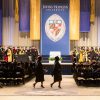Appropriately, the School of Education’s first one-of-a-kind virtual graduation ceremony featured a keynote address by an online learning pioneer.
Although more than half of the school’s students already take courses online, the event marked a year in which online instruction became a necessity for all. The graduates also were remarkable in their diversity: Of 983 degrees awarded this year, 417 (or 42 percent) were received by students from underrepresented minority groups and students from other countries.
Without an in-person gathering, graduates were innovative in celebrating their achievements—and sharing the inspiring stories behind them—through video chatrooms, text messaging, and social media.
One of them, Abraham Hernandez, who received a master of science in educational studies, posted a message on Instagram honoring the tireless work and sacrifice of his parents, who came to the United States from Mexico to work in the agricultural fields of Northern California. “To everyone who has helped me on this very long, exhaustive, and transformative journey, I promise to not let you down,” he wrote. “This is only the beginning of something great.”
Keynote speaker R. Christopher Hoehn-Saric was introduced by Dean Christopher Morphew as someone who has helped to “redefine, reimagine, and reinvigorate the field of education.” Hoehn-Saric went on to tell degree candidates, families, and friends that he was not there to sell entrepreneurship as “the path to an impactful life.” Instead, remarking on the impact of the pandemic on lives and communities around the world, he shared his own story as “a first-generation, biracial kid from a unique family” who saw America, for all its imperfections, as a place of “undeniable hope.”
Hoehn-Saric, a Johns Hopkins alumnus who is co-founder of Sterling Partners, the private equity firm behind Sylvan Learning and dozens of other education companies, issued a challenge to the graduates. “During times of turmoil, the one unassailable truth is that educators can change lives,” he told them. “Do not accept the status quo, and do not let bureaucracies and traditions be excuses for inaction. Education needs leaders who are undeterred, who embrace change.”
During the ceremony, three other alumni and a faculty member also were recognized for their contributions with awards presented by Johns Hopkins Alumni Association President Allyson Handley, EdD ’78, herself a School of Education alumna.
- The Global Achievement Award went to Americo Nobre Gonçalves Ferreira Amorim, EdD ’18, for his innovative work developing educational games and digital platforms easily accessible to low-resource schools and low-income families. His games and applications are now used by millions of students in his native Brazil, and soon, many in the U.S.
- Amal E. Awad, BS ’11, MS ’12, received the Community Champion Award, recognizing her groundbreaking career in law enforcement, culminating in her appointment as the first African American, first female, and first LGBTQ police chief in the history of the City of Hyattsville (Maryland) Police Department.
- The Woodrow Wilson Award was presented to Maryland Senate President William Ferguson, MAT ’07. The award recognized Ferguson’s steadfast commitment to education and the well-being of underserved communities in the Maryland State Senate and on the Kirwan Commission, the state’s most important education policy body.
- Assistant Professor Lieny Jeon received the association’s Excellence in Teaching Award, an honor drawn from student nominations. Praised for her “deep knowledge and care for students,” Jeon teaches in the PhD program and is affiliated with the IDEALS Institute and the Baltimore Education Research Consortium.
Dean Morphew also presented the Champion in Education Award to John Erickson, chairman of Retirement Living Television and longtime member of the school’s National Advisory Council. Morphew honored Erickson for his educational vision and dedication to improving lives—especially in the creation of NorthBay, a unique educational retreat and state-of-the-art environmental center located on the Chesapeake Bay.
In all, the school awarded 35 doctoral degrees, 818 master’s degrees, 122 graduate certificates, and eight bachelor’s degrees.

